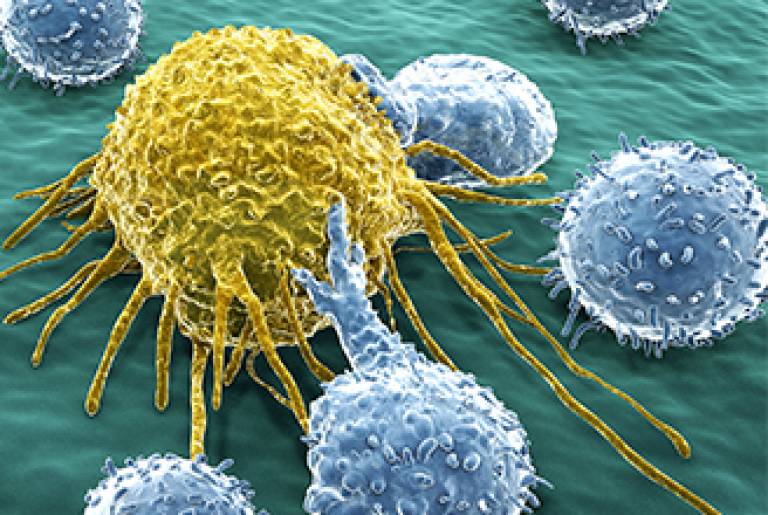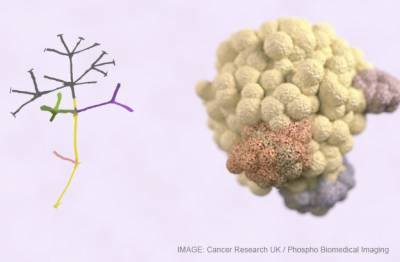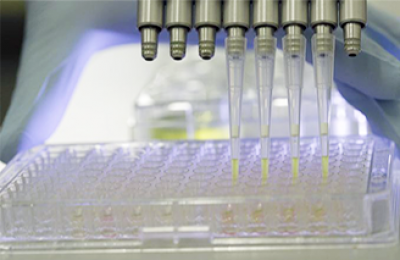Gene editing activates cancer-killing immune cells
15 April 2016

In a new study published today in Cancer Research, a UCL research team led by Professor Karl Peggs and Dr Sergio Quezada have discovered that cutting off a sleep-switch on immune cells inside a tumour wakes up the cells and enables the immune system to hunt down and destroy cancer.
Cancer cells are very adaptive - they exploit this switch to hide from the immune system and avoid attack. Now researchers have shown that it is possible to use genetic editing to snip away the ‘off switch’ so that the immune system recognises cancer again.
The team used a cutting-edge gene editing technique to remove the switch - called PD-1* - from T cells found in the tumour. They found that the immune system was then able to wipe out the cancer cells which no longer had control over the T cells.
Researchers refer to this as ‘cutting the brakes’ and allowing immune cells to do the rest.
The study was carried out on mice in the laboratory. The researchers took T cells from the tumour, removed PD-1, multiplied the T cells and put them back into the mice and found that the tumours shrank. In experiments on melanoma and fibrosarcoma, mouse survival increased from less than 20% after 60 days without treatment to more than 70% with treatment.
Going forward, the next step will be to test this approach in clinical trials.
Dr Sergio Quezada, Head of the Immune Regulation and Cancer Immunotherapy lab at UCL Cancer Institute says: "This is an exciting discovery and means we may have a way to get around cancer's defences while only targeting the immune cells that recognise the cancer.
"While drugs that block PD-1 do show promise, this method only knocks out PD-1 on the T cells that can find the tumour - which could mean fewer side effects for patients."
*The PD-1 switch – found on T cells – is normally a safety device that stops the immune cells from wrongly attacking harmless cells.
Further information
- Research paper: Menger et al., TALEN-mediated inactivation of PD-1 in tumor-reactive lymphocytes promotes intratumoral T cell persistence and rejection of established tumors. Cancer Research, 2016.
- Dr Sergio Quezada academic profile
- Professor Karl Peggs UCLH profile
- Source: Cancer Research UK
- Cancer Research-UK UCL Centre
- UCL Faculty of Medical Sciences
- UCLH NIHR Biomedical Research Centre
- Cellectis
The study was funded by Cancer Research UK and also by a EU FP7 grant. Professor Karl Pegg's research with patients is supported by the National Institute for Health Research University College London Hospitals Biomedical Research Centre. It was also supported by the Experimental Cancer Medicine Centres (ECMC) Network - an initiative funded in partnership between Cancer Research UK and the four Health Departments of England, Scotland, Northern Ireland, and Wales.
Related news

New genetics discovery paves the way to transform immunotherapy treatments
An international team of scientists, led by Dr Sergio Quezada and Professor Charles Swanton, have made a groundbreaking discovery in understanding how the genetic complexity of cancerous tumours can be recognised and exploited by the immune system, even when the disease is at its most advanced stages.

Accelerating Immunotherapy with £5m Award
Cancer Research UK has awarded a £5 million Centres Network Accelerator Award to UCL’s Cancer Research UK Centre to fund a new cancer immunology and immunotherapy network across various Cancer Centres in London - led by Professor Henning Walczak, Scientific Director of the Cancer Research UK – UCL Centre and Professor of Cancer Biology at the UCL Cancer Institute.
 Close
Close

